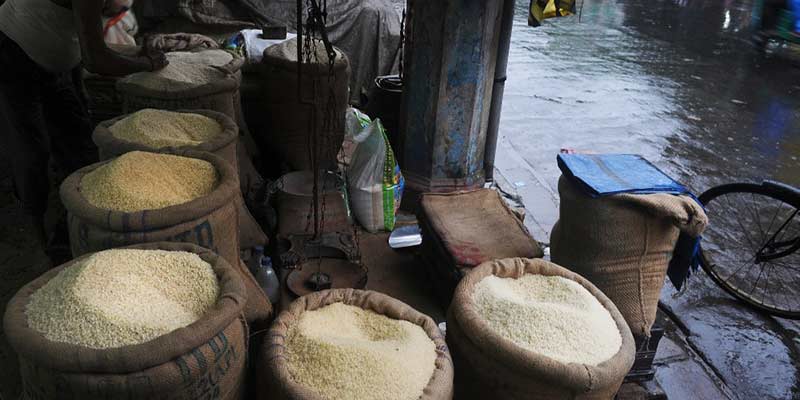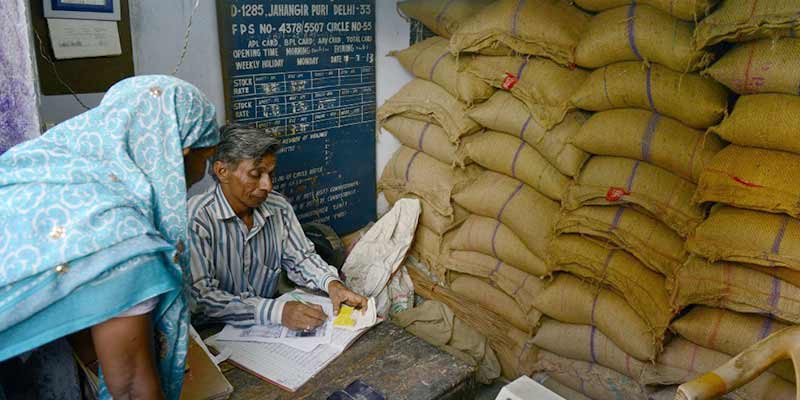- India
- Aug 21
Govt to transform ration shops to ‘Jan Poshan Kendras’
• Union Food Minister Pralhad Joshi launched a pilot project to transform 60 Fair Price Shops (FPS), also called ration shops, into ‘Jan Poshan Kendras’ across Uttar Pradesh, Gujarat, Rajasthan, and Telangana, aiming to boost their viability and improve nutrition access.
• The pilot project allows FPS dealers to diversify their inventory beyond subsidised grains.
• The revamped shops can now stock millets, pulses, dairy products, and daily essentials, potentially opening up new revenue streams for the dealers.
• Jan Poshan Kendras will offer a diverse range of nutrition-rich food items to consumers as well as provide an additional source of income to the FPS dealers.
• As part of this initiative, about 60 FPS have been identified, which will receive credit facilities from SIDBI, and access to over 3,500 products across various staples and FMCG categories.
• The minister emphasized that the existing commission structure for FPS dealers is inadequate, necessitating alternative approaches to utilise shop space and manpower more effectively. In some areas, FPS open for just 8-9 days, while others operate only once every three months. The rest of the time, these shops remain closed, he said.
• With approximately 5.38 lakh FPS operational across India, the successful implementation of this pilot could pave the way for a nationwide transformation of the ration shop network.
• The responsibilities for licensing of FPS, their monitoring and continuous oversight of operations rests with the respective state/UT governments.
• As the pilot project unfolds, it remains to be seen how this re-imagining of ration shops as nutrition hubs will impact both dealers and beneficiaries in the Public Distribution System.
Public Distribution System (PDS)
• The Public Distribution System (PDS) evolved as a system of management of scarcity through distribution of foodgrains at affordable prices. Over the years, PDS has become an important part of government’s policy for management of food economy in the country.
• PDS is supplemental in nature and is not intended to make available the entire requirement of any of the commodities distributed under it to a household or a section of the society.
• PDS is operated under the joint responsibility of the central and state/UT governments.
• The central government, through Food Corporation of India (FCI), has assumed the responsibility for procurement, storage, transportation and bulk allocation of foodgrains to state governments.
• The operational responsibility including allocation within state, identification of eligible families, issue of Ration Cards and supervision of the functioning of Fair Price Shops (FPS), etc rest with state governments.
• Under the PDS, presently the commodities namely wheat, rice, sugar and kerosene are being allocated to states/UTs for distribution.
• Some states/UTs also distribute additional items of mass consumption through the PDS outlets such as pulses, edible oils, iodised salt, spices, etc.
• End to-end computerisation of PDS operations in all states/UTs has resulted in significant progress achieved at the national level in terms of 100 per cent digitisation of Ration Cards, online allocation modules for generation of monthly foodgrain allocation orders up to the Fair Price Shops (FPS), installation of electronic Point of Sale (ePoS) devices, computerisation of supply chain management, online grievance redressal systems and initiation of transparency portals.
• Backed by the sustained technological progress, the government launched One Nation One Ration Card (ONORC) plan in August 2019 with four states, and by the end of June 2022, ONORC was operational across all 36 states/UTs of the country.
Targeted Public Distribution System (TPDS)
The Targeted Public Distribution System (TPDS) is implemented under the National Food Security Act (NFSA), 2013 in all states/UTs.
The Act provides coverage upto 75 per cent of the rural population and upto 50 per cent of the urban population for receiving foodgrains (rice, wheat & coarse grains) under Priority Households and Antyodaya Anna Yojana (AAY).
The Priority Households are entitled to receive 5 kg of foodgrains per person per month and the households covered under the AAY receive 35 kg of foodgrains per month per household.
Under the TPDS, foodgrains were provided at subsidised prices up to December, 2022. However, from January 1, 2023, foodgrains under the Act are being distributed to eligible beneficiaries free of cost under Pradhan Mantri Garib Kalyan Anna Yojana.
National Food Security Act, (NFSA) 2013
• Though the Indian Constitution does not have any explicit provision regarding right to food, the fundamental right to life enshrined in Article 21 of the Constitution may be interpreted to include the right to live with human dignity, which may include the right to food and other basic necessities.
• Though the issue of ‘food security’ at the household is continuously being addressed by the government since long, through the Public Distribution System and the Targeted Public Distribution System, the enactment of the National Food Security Act, (NFSA) 2013 on July 5, 2013 marked a paradigm shift in the approach to food security from welfare to rights based approach.
• The Act legally entitles up to 75 per cent of the rural population and 50 per cent of the urban population to receive subsidised foodgrains under Targeted Public Distribution System.
• About two-thirds of the population therefore is covered under the Act to receive highly subsidised foodgrains.
• Under NFSA, subsidised food grains are distributed at Rs 3 per kg for rice, Rs 2 per kg for wheat and Rs 1 per kg coarse grains to beneficiaries.
• As a step towards women empowerment, the eldest woman of the household of age 18 years or above is mandated to be the head of the household for the purpose of issuing ration cards under the Act.
• The Act is being implemented in all states/UTs, and on an all India basis, out of maximum coverage of 81.35 crore persons, around 80 crore persons have been covered under NFSA at present for receiving highly subsidised foodgrains.
• The identification of beneficiaries by states/UTs is a continuous process, which involves exclusion of ineligible/fake/duplicate ration cards and also exclusion on account of death, migration, etc and inclusion on account of birth as also that of genuine left-out households.
Manorama Yearbook app is now available on Google Play Store and iOS App Store


